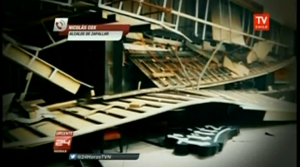
(Reuters) — Chile’s President Michelle Bachelet said three people were killed when a strong earthquake shook the country on Wednesday and said she would travel to the worst-affected areas.
The magnitude 8.3 quake was the most powerful to hit Chile in five years and triggered flooding in some coastal towns and sent terrified resident pouring into streets.
“Once again we’re having to deal with another harsh blow from nature…. Unfortunately we’ve received information that as of now we are certain three people are confirmed dead,” Bachelet said in a televised statement.
The earthquake hit off the coast of Chile, about 280 km (175 miles) north of Santiago, the biggest earthquake since 2010 to hit the world’s top copper producer.
The quake, which was felt as far away as Buenos Aires in Argentina, also damaged homes, buildings and injured several people.
A 26-year-old woman was killed by a collapsing wall and another person died from a heart attack, according to media reports.
The coastal town of Coquimbo was hit by waves of up to 4.5 meters (15 feet) after the earthquake, Chile’s navy said.
The inland city of Illapel, about 46 km (28 miles) from the epicenter, was without electricity or drinking water. People fled their damaged homes and poured into the streets, the mayor said.
State copper miner Codelco said it had suspended mining operations at its Andina mine and that it had evacuated workers from its Ventanas smelter. Antofagasta Plc said it had halted operations at its flagship Los Pelambres copper mine and would wait until daybreak to assess damage.
Tsunami advisories were issued for parts of South America and as far away as Hawaii, California and French Polynesia.
Tsunami waves of 1 meter to 3 meters (3 to 10 feet) are possible for French Polynesia starting at 0800 GMT, said the Pacific Tsunami Warning Center.
Waves of 15 to 20 cm (6 to 8 inches) hit the Peruvian coast, and waves of less than 1 meter were expected in Hawaii around 3:06 a.m. Hawaii Standard Time (1306 GMT) on Thursday, the Pacific Tsunami Warning Center said.
Less than an hour after the initial earthquake, three aftershocks all greater than magnitudes 6.1 struck the region and smaller quakes continue to shake the area, USGS reported.
In April 2014, an 8.2-magnitude quake struck near the northern city of Iquique.
In February 2010, an 8.8-magnitude earthquake in central-southern Chile triggered a massive tsunami, and more than 500 people were killed.
In the hours following that quake, President Michelle Bachelet and other government officials misjudged the extent of damage and declined offers of international aid. That delayed the flow of assistance to disaster areas, leaving many survivors feeling they had been abandoned by the government.
Compounding matters, the Chilean navy’s catastrophe-alert system failed to warn the population of impending tsunamis, leaving hundreds who survived the initial quake to be engulfed by massive waves that followed.
Bachelet´s government was also slow to prevent looting following the quake







